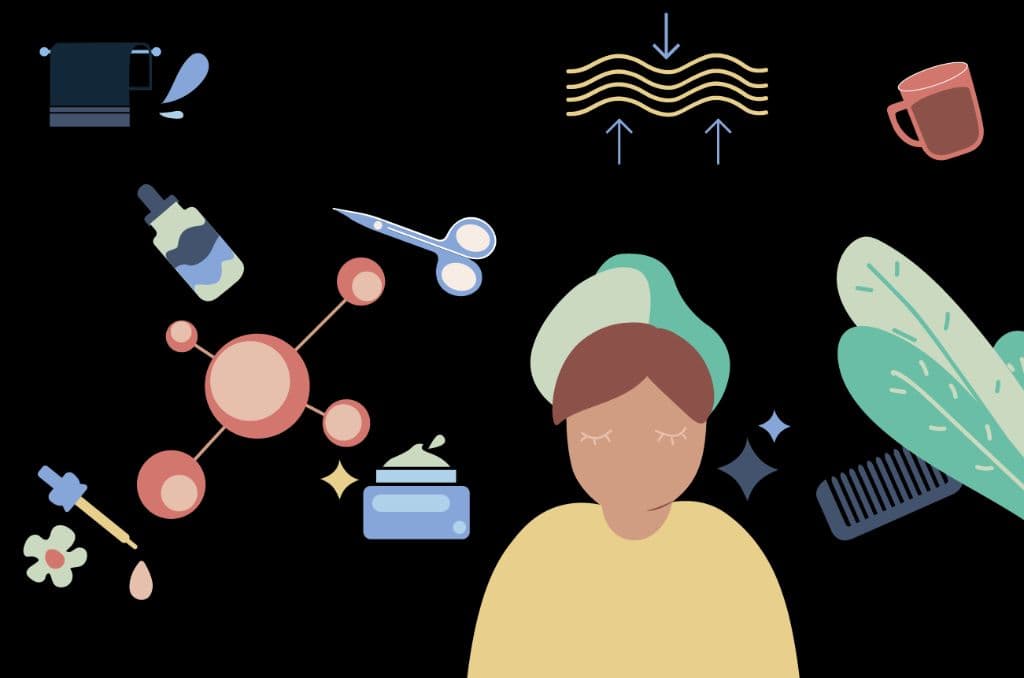This blog has been compiled by Komal Adhlaka, a content writer for Proactive For Her.
Hairfall can be caused because of an unhealthy lifestyle, environmental contamination, stress, inappropriate diet, hormonal changes, etc. These are viewed as the primary threats that prevent us from having strong hair. Therefore, we need to keep a characteristic diet for healthy hair and reduce the usage of synthetic compounds on our hair. It is normal to shed a specific measure of hair consistently. However, if more than the usual amount of hair loses out, it can cause distress and worry. While male and female pattern baldness is an essential driver of hair loss, there is a scope of different reasons. A doctor will need to investigate these before suggesting the fitting treatment. Here are some lesser-known causes of hair fall:
Stress
Stress can cause hair loss or excessive shedding of hair. Our body perceives mental and physical stress the same way, and any dramatic stressor on the body can stop hair growth. When the hair growth is halted, hair begins to shed. Specifically, when the body is stressed it releases the hormone cortisol, which can then affect the hair follicle and cause hair loss. That shedding typically occurs at least three months following a stressful event. It causes telogen effluvium which is a temporary (most of the time) condition where the hair remains in the telogen or naturally shedding phase of the growth cycle which could lead to a major hair loss. It can range from mild to chronic T.E. Some possible causes include:
Mental Causes
- Emotional turmoil
- Poor lifestyle
- Inadequate or improper food intake
- Smoking or drinking
- Trying to cope with the rat race
- Trying to find a balance between work, family, relatives, and self.
Physical Causes
- Menstruation
- Accident, surgery, or hospitalization
- Illnesses such as dengue, malaria, asthma, etc.
Underlying Medical Condition
Ringworm
Ringworm is a fungal infection on the scalp or tinea capitis that can cause bald areas on the head. Symptoms include:
- brittle hair
- a small spot that causes scaly, bald, skin patches
- itchy, red patches of skin in the affected areas
- ring-like patches and redness
- the appearance of blisters on the scalp
Polycystic ovary syndrome
PCOS is an imbalance in male and female sex hormones. An excess of androgens can lead to ovarian cysts, weight gain, a higher risk of diabetes, changes in your menstrual period, infertility, and hair thinning. Women may experience more hair on the face and body as male hormones are overrepresented in PCOS.
Thyroid Hormone disorders
Thyroid conditions—like hyperthyroidism and hypothyroidism—can cause a range of hair issues, including thinning or missing eyebrows (mainly on the outer edge of the eyebrow), soft and fine hair along hair thinning, shedding, and less hair on other parts of the body. Of course, if you have experienced hair loss with a thyroid issue, the best bet is to speak with your doctor about treatment possibilities—but usually, treating the underlying cause first is essential to treating any other associated issues.
Systemic Lupus Erythematosus
Systemic lupus erythematosus (SLE) is the most common type of lupus in which the immune system mistakenly attacks its healthy body tissues or organs, causing widespread inflammation and diseases in the organs. Lupus can cause hair thinning on your scalp, although a few people lose clumps of hair. Loss of eyebrows, eyelashes, beard, and body hair also is possible.
Trichotillomania
This is an "impulse control disorder" that causes people to compulsively pull their hair out. It often begins before 17 and is 4 times more common in women than in men.
Alopecia areata
Alopecia areata is an autoimmune condition that causes hair to fall out from the scalp, suddenly. The immune system attacks hair follicles and parts of the body. This condition is self-limiting but a doctor’s advice should be preferred.
Anagen effluvium
Anagen effluvium may cause large amounts of hair to fall out rapidly during the growth (anagen) phase of the hair cycle. Causes of anagen effluvium include:
- chemotherapy
- autoimmune disease
- fungal infections
- Radiation
Genetic Causes
Androgenetic alopecia
Androgenetic alopecia or male/female pattern baldness is a very common cause of hair loss. Male and female pattern baldness is genetic. Hair loss in males occurs mostly in the temples and crown of the head. While on the other hand, females find their hair thinning from all over the head. Androgenetic alopecia is more likely to happen during the later years of one’s life, in certain cases, however, it can occur any time after puberty. Many females with androgenetic alopecia develop it after going through menopause.
Miscellaneous Causes
Birth control pills
People may experience hair loss while using birth control pills or sometimes after they stop taking them. Other forms of birth control such as implants and skin patches, may also affect the hormones in the body, causing hair loss. The American Hair Loss Association recommends taking a non-hormonal birth control measure for people who have an increased risk of genetic hair loss. Many doctors suggest taking birth control pills with a low androgen index to prevent hair loss.
Post-Pregnancy
Many women experience heavy hair fall after childbirth. One notices bunches of strands falling off suddenly after experiencing luscious locks during pregnancy. This is temporary and is caused when the estrogen levels return to normal the hair growing phase slowly moves to the resting phase. This usually subsides within 6 months to 1 year of childbirth.
Nutritional deficiencies
Nutritional deficiencies can cause hair to fall out. Diets that are low in protein and certain vitamins, can sometimes cause excessive hair shedding. For example, having less protein, Vitamin B or D in your diet can lead to unwanted hair loss. It may also be a reason why people following the keto diet also report some hair loss from the change in their eating habits.
Low Iron Levels
The American Academy of Dermatology suggests that not an iron-deficient diet can lead to unwanted hair loss, too. Iron deficiency anemia occurs when you don't have enough iron in your body. Its symptoms include fatigue, tiredness, shortness of breath, or chest pain.
Genetics
Hair fall due to genetics is something that we cannot control. This is one of the major causes of hair loss caused due to hereditary conditions such as male and female pattern baldness and may have predictable patterns and symptoms such as a receding hairline and bald spots in men and thinning of hair in women which occurs gradually with age.
Excessive Hair Styling
Vigorous styling and hair treatments can lead to hair loss over some time. Hairstyles including tight braids, hair weaves or Dutch curls and chemical sprays and gels to straighten your hair, hot-oil treatments, or any kind of high heat may all damage your hair and cause them to break out. Because these practices can affect the hair roots, and primarily damage the hair shaft, your hair might take longer than anticipated to grow back.
Pollution
Heat, dust, pollution, and grime can cause both dry hair and scalp, affecting your hair quality adversely and eventually causing hair loss. Whether you’re indoors in the air conditioning, or outdoors with the harmful UV rays of the sun, exposure to harsh environmental factors can strip the hair of all its nutrients, leading to hair loss.
Medications
Sudden hair loss may be caused by a side-effect of certain kinds of medications. Medicines like Vitamin A supplements, antibiotics, antifungal drugs, immunosuppressants, hormonal pills, antidepressants, etc. may cause temporary hair fall or Telogen Effluvium or permanent hair loss like pattern baldness. If you experience unusual hair fall within a few days of taking these drugs, you must go to your doctor and ask for a safer alternative instead.
Tight Hairstyles
Many young girls and women experience a type of sudden hair loss called Traction Alopecia due to wearing tight hairstyles like braids, ponytails, etc. Pulling the hair strands tightly causes severe damage to the hair roots and makes the strands fall out. Although it can be reversed in the early stages, repeated tension or pulling can lead to permanent bald patches on the scalp.
Sudden Weight Loss
Sudden weight loss is a form of physical trauma that can result in thinning hair. This could happen even if the weight loss is ultimately good for you. It’s possible that the weight loss itself puts unnecessary stress on your body, or that not eating right can result in vitamin or mineral deficiencies. Loss of hair along with noticeable weight loss may also be a sign of an eating disorder such as anorexia or bulimia.
Final Words
Losing a minimal amount of hair regularly is very normal. People usually lose up to 100 hair every day. If you’re noticing more-than-usual hair loss, there may be an underlying condition where a doctor’s advice and subsequent treatment may help you cure. In many cases, hair loss can be reverted to a normal state once a doctor has treated the underlying condition.
Disclaimer - This information is provided for educational purposes and should not be construed as medical advice. Please consult with your healthcare practitioners before undertaking any changes in your diet or adding supplements.
ProactiveForHer is a digital clinic for women, offering accessible, personalized, and confidential health-care solutions. We offer products and services for out-patient health concerns of Indian women, across their lifetime - from puberty to pregnancy to menopause. To know more on the sexual and reproductive health of women, visit https://www.proactiveforher.com/

